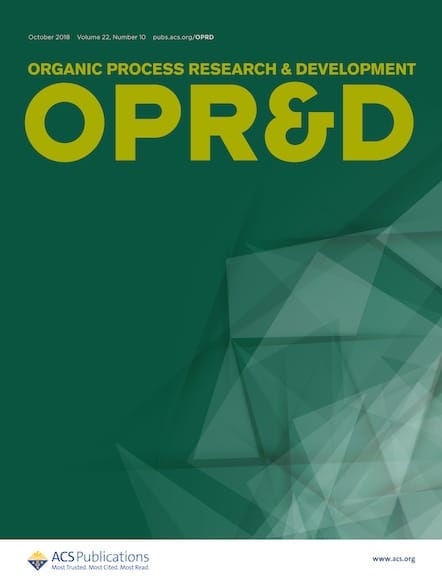Get to know the 2025 winners, read their winning article, and learn about their plans for building upon their existing research.

Organic Process Research & Development (OPR&D), in partnership with the ACS Division of Organic Chemistry, is proud to announce the winners of the 2025 Organic Process Research & Development Outstanding Publication of the Year Lectureship Award: Dr. Hsiao-Wu Hsieh and colleagues.
This award, chosen by a global committee of journal and Division representatives, honors the research team behind an outstanding article published in an issue of Organic Process Research & Development in the preceding year that demonstrates creativity and impact in the field of process chemistry and related disciplines associated with reaction scale-up, with a focus on early-career researchers. Dr. Hsieh and his colleagues were selected for their article, “A Continuous Process for Manufacturing Apremilast. Part I: Process Development and Intensification by Utilizing Flow Chemistry Principles.”
The research team will be honored during an ACS Division of Organic Chemistry symposium at ACS Fall 2025, held in Washington, D.C. from August 17-21. Come see Dr. Hsieh deliver the award lecture!

Dr. Hsiao-Wu Hsieh, a synthetic organic chemist by training, currently serves as a Process Development Principal Scientist at Amgen’s Massachusetts site. He holds chemistry degrees from National Taiwan University and the University of California-Davis, with a focus on carbohydrate chemistry and glycolipid/cancer antigen total synthesis. He has an interest in flow chemistry and joined Novartis as a post-doctoral scholar working at the MIT-Novartis Center for Continuous Manufacturing in 2016. There, he collaborated with Prof. Klavs Jensen’s group to develop a self-optimizing flow reactor to support medicinal chemistry projects. Since joining Amgen in 2018, he has primarily worked on small molecule process development projects and has contributed to implementing flow chemistry and lab automation technologies within the organization.
Read the Interview With Dr. Hsieh
What does winning this award mean to you?
First of all, I am humbled and grateful to be recognized by OPR&D for our continuous manufacturing process development work on Apremilast synthesis. I would like to emphasize that this project involved a dedicated team of scientists and engineers who showed their resiliency and committed themselves to serving patients during the height of the pandemic, despite numerous uncertainties and challenges. With the support of management and our belief in new technology, our team was able to address sustainability and supply chain issues by implementing flow and green chemistry principles. It was gratifying to witness a team of experts collaborating towards common goals. Not only did we deliver life-saving products, but we also advanced technology and established a flow chemistry workflow, laying the foundation for future lab automation applications and cross-disciplinary collaboration among pipeline projects. Initially, we were just being eager to share our exciting experiences of this journey, and I am pleased that our work resonates with professionals in this field.
How would you describe your research to someone outside your field of research?
As a process chemist collaborating closely with process engineers and analytical scientists, our mission is to develop commercial processes that can be scaled up efficiently, safely, and sustainably to meet the demand of various phases of clinical trials and commercial launches. The research involves a series of process de-bottlenecking, accumulating improvements over time. These small but important advancements contribute to overall improvement and robustness of the process. Flow chemistry, as an emerging field in synthetic organic chemistry, has incorporated techniques from the well-developed oil and petroleum industry, which focuses on producing commodities continuously with high yield, precise control, minimal waste, and automation. As a versatile synthetic tool, flow chemistry has gained significant attention over the past decade. In fact, the latest OPR&D Flow Chemistry Special Issue highlights that flow chemistry and continuous manufacturing are becoming more mainstream than ever, as evidenced by industrial case studies addressing challenging chemistries with specific requirements. There are always opportunities for improvement. Participation in this ongoing journey is welcomed to everyone.
What do you think is the biggest challenge currently in your area of research?
Flow chemistry, also known as continuous manufacturing (CM), requires changes in norms and front-end investment similar to any new technologies. Compared to traditional batch chemistry, which has been practiced by chemists and engineers for centuries, early adapters of flow chemistry need to present compelling case studies and practical reasons for conversion. Although flow chemistry thrives in homogeneous conditions and some fast reactions, challenges remain with multi-phase reactions, such as solid- or gas-generating reactions, which may cause clogging or mixing issues. Chemistries requiring good mass, photon, or electron transfers, such as biocatalysis, photochemistry, and electrochemistry have found to be beneficial in flow modes but are still limited to relatively simple substrates and straightforward chemical transformations. Additionally, direct translation of batch unit operations to flow may not as straightforward as expected as we demonstrated in our research, which usually require overhauling the process. Personally, I am optimistic about the direction of this area as I believe those challenges are valuable knowledge we gained during the exploration. As long as we keep vigilant and open-minded when collaborating with people with diverse background, I believe there are always creative solutions to be found.
What is next in your research? What new research are you doing to build on the findings described in your paper?
Building on our previous achievements, we aim to further explore opportunities to implement flow chemistry principles across various phases of process development and within different pipeline modalities. Due to the modular design of flow chemistry equipment, we can apply them to unit operations that necessitate precision control, such as flow rate, temperature, and chemical equivalency. Additionally, the flow chemistry platform facilitates the integration of various Process Analytical Technologies (PATs) and automation software capable of conducting planned Design of Experiments (DoE) or optimization experiments based on high-quality data acquired from the platform. This paves the way for more data science and artificial intelligence applications.
We are also fully committed to advancing the concept of Industry 4.0, where we have the opportunity to integrate big data analysis, artificial intelligence, robotics, and the Internet of Things into the pharmaceutical industry. To begin, we plan to enhance the user-friendliness and accessibility of our platform and workstream.
Have there been any highlights in your career to date that you are especially proud of?
Rather than listing my personal highlights, I would like to take this opportunity to extend my gratitude to the individuals I have collaborated with, particularly those advisors who have inspired me throughout my chemistry journey and aided in my career decisions. My initial exposure to Industry 4.0 and flow chemistry concepts occurred in 2013 through my advisor at UC Davis, Dr. Jacquelyn Gervay-Hague, who was serving as the Chemistry Director at the National Science Foundation (NSF). She encouraged me to pursue a career in industry and apply these concepts to real-world problems, which ultimately led me to an exciting post-doctoral position at the Novartis-MIT Center for Continuous Manufacturing. In this program, I had the privilege of working with Dr. Richard Robinson (NIBR) and Professor Klavs Jensen (MIT Chemical Engineering) and his team on developing a self-optimizing oscillatory flow segment reactor to optimize photochemistry and utilize it to generate building blocks for medicinal chemistry SAR studies. Subsequently, I joined Amgen as a process chemist, where I continued my research on flow chemistry and gained hands-on experience of process development. At Amgen, I have had the opportunities to collaborate with talented and motivated colleagues and consistently challenge the status quo. The Otezla CM project exemplifies the achievements that was made possible through a highly integrated cross-functional process development team (DOI: 10.1021/acs.oprd.3c00400; 10.1021/acs.oprd.3c00403; 10.1021/acs.oprd.4c00155). Time has flown by while working on these fun projects, which helped connect various elements and lead to new possibilities. The recognition of our CM work was a surprised honor and is undoubtedly the highlight of our collective efforts.
What would your advice be to someone just starting out in the field?
I chose chemistry as a career because it offers continuous learning opportunities through practical applications. For those beginning their careers in process chemistry, I recommend maintaining a curiosity about emerging technologies and acquiring knowledge through hands-on experience. Seek out opportunities as they arise, as these can lead to unforeseen advancements in your career. Along this journey, it is important to recognize your strengths and build confidence for future challenges. A career should be viewed as a journey; appreciating the experiences and relationships formed along the way is rewarding and fulfilling. Prioritizing the end goal over valuable connections or other important aspects may result in burnout or a sense of unfulfillment.
As a first-generation immigrant and the first person in my family to attend graduate school, I consistently encounter changes and uncharted territories. I have found that continuously asking "why" and "how" keeps me motivated, even when the solutions are suboptimal. Over time, I have gradually learned to enjoy making progress on my own pace instead of being anxious about rushing to the finishing line. After all, first-hand experience and hard-earned results are usually most solid and unforgettable. Last but not least, stay healthy, live long and prosper!

